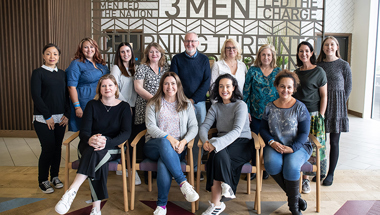Ten things to help you feel more in control
If your treatment isn’t working and you’re approaching the end of your life, it’s completely normal to feel like a lot of things are out of your control. You may be feeling overwhelmed, uncertain about what might help, or unsure where to turn for support.
But there are things you can do to help you take back control over parts of your life. Your family or friends may be able to help you with some of them.
Things you can do
1. Set yourself some small goals
These could be small things like getting dressed every day, going on a short walk or seeing a friend once a week. Small goals can help bring a sense of structure and purpose to your days.
2. Think about who you want to spend time with, talk to or write to
You might want to make a list of people you’d like to get in contact with. Some men just want to spend time with their close family and friends in their final months and weeks. Others may want to call or write to, perhaps people you haven’t spoken to for a while. Reconnecting with others can bring comfort and help clear your thoughts.
3. Make a list of your medicines and doses
Keeping a record of the medicines you’re taking can help if you see different doctors or nurses who might not have all your medical information, or if you need to go into hospital or a hospice. You may want to ask a family member or friend to help you keep this list up to date, especially if it feels like a lot to manage on your own. Having someone support you with this can make things easier and give you one less thing to worry about.
4. Talk to your GP
If you have any questions or worries, you can book an appointment with your GP to talk about them. It can help to write down what you want to discuss to ensure you get the most from your appointment. Your GP may not be able to talk about everything in one appointment, so you might want to ask for a longer appointment or visit them more than once. Your GP can also tell you about other support services available in your area and refer you for psychological support if they feel it could help.
5. Find out about the symptoms of MSCC
Metastatic spinal cord compression (MSCC) is a very serious medical condition. It affects some men with advanced prostate cancer. If you have symptoms, it’s important to get medical advice straight away. Knowing the symptoms can help you know what to look out for.
6. Think about where you want to be cared for
Visit local nursing homes, residential homes or hospices to help you understand what options are available. This can help you decide where you’d like to be cared for if you ever need the care and support that these places provide. Check what local services are available if you want to be cared for at home.
7. Visit your local hospice
Hospice care isn’t just for people in their final days. Many hospices offer services like counselling, nursing care, activities, and cafés. They can be welcoming, supportive places. Most are happy to show you around and explain what they offer.
8. Join our online community
Connect with other people affected by prostate cancer on our online community. Members include men with prostate cancer, their family and friends, and people who have lost a loved one to prostate cancer. Anyone can ask a question or share an experience. It’s a place to deal with prostate cancer together.
9. Support groups
People affected by prostate cancer get together to share their experiences of living with it. Some groups also hold meetings online. You can ask questions, share worries and know that someone understands what you’re going through. Some groups have been set up by health professionals, others by men themselves. Many also welcome partners, friends and relatives. To find your local support group, please visit www.tackleprostate.org/supportgroups
10. Plan time to rest
Living with advanced prostate cancer can be physically and emotionally draining. Even small things, like getting dressed, might make you feel very tired cancer. It’s important to listen to your body and take things at your own pace. Taking regular breaks, having quiet time, or even just sitting somewhere peaceful can help you save your energy and feel more comfortable.
Reviewers
Updated: August 2025 | Due for Review: August 2028
- Marguerite Bingle, Prostate Cancer Clinical Nurse Specialist, East Suffolk & North Essex NHS Foundation Trust
- Will Ince, Consultant Oncologist, Cambridge University Hospitals NHS Foundation Trust
- Nicola Lancaster, Macmillan Metastatic Uro-Oncology CNS, Dartford & Gravesham NHS Trust
- Our Specialist Nurses
- Our volunteers.


